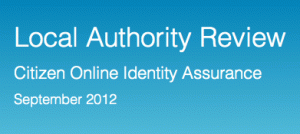Local government is facing many challenges in providing digital services to citizens and a significant barrier to that is identity assurance.
In order to understand these challenges, GDS commissioned a small sample review. You can read the full report here.
Objectives of the Review
The aim of the review was to provide an overview of the ways in which citizens register and identify themselves to their local authorities online.
Findings
Our findings indicate a varied landscape within local government. A number of local authorities (LAs) are looking at the market place for solutions but are keen to share knowledge and collaborate with the GDS Identity Assurance Programme (IDAP). They are also keen that their plans are scalable and align with the national approach. This will ensure that LAs don't have to re-engineer solutions in the future.
Benefits and Barriers
The review identifies several benefits for citizens including greater user satisfaction, security and convenience. Local authorities would benefit from improved efficiency and reduced costs. Barriers include organisational silos, costs, data matching, citizen trust, accessibility and usability.
Next steps
IDAP would like to hear from any LA taking a similar approach to identity assurance, which gives people a choice of how to login to services. It would also like to hear from any LAs interested in speaking at the Open Identity Exchange (OIX) about their supplier requirements.


11 comments
Comment by simonfj posted on
Amanda,
You'd be aware that WAYF and other federations are quite mature initiatives in the eduspace. https://refeds.terena.org/index.php/Federations And a campus can be considered a LA.
Even the EC networks use the service. https://ecas.ec.europa.eu/cas/wayf
Networks can't distinguish between between a (federated) .gov or .edu service. Same benefits and barriers.
You might be aware that GEANT members have even done a proof-of-concept that "interconnects identity federations around the world, simplifying access to content, services and resources for the global research and education community". http://www.geant.net/service/eduGAIN/about_edugain/Pages/AbouteduGAIN.aspx
So taking that your team is now at the point where ".. a proven nationally recognised approach is (to be put) in place with a recognised and trusted branding, it is suggested that the branding could then be integrated into LA websites", perhaps you might want to use a brand (like WAYF) that's already in use. No need to reinvent a wheel.
Comment by Pete Hardy posted on
Within my LA, we have just started a major project to overhaul our eServices, an element of which is authentication, I know this subject will prove a sticking point to the progression of the project and am currently researching options. For all the reasons highlighted by Phil Rumens, I would be extremely interested in taking part in any work that would facilitate an answer...
Comment by amandaderrick posted on
Pete it is good to know that so many LAs are still focusing on digital delivery of services. We are working with several LA groups, such as the Local Government Delivery Council to ensure as much alignment as possible in approaches to identity assurance. I have noted your interest in working with one of these groups.
Comment by Identity assurance – Stepping Up A Gear | Government Digital Service posted on
[...] guides and privacy principles, and we’ve reached out beyond central government to understand the needs and opportunities for Local Authorities and the wider public [...]
Comment by Robert Clark posted on
As Wandsworth is currently running a PQQ to set up a Framework Agreement for London Boroughs for a single sign-on customer portal, this is of great interest to us!
Comment by amandaderrick posted on
Robert that is good to know and Wandsworth as you know were interviewed as part of the review
Comment by William from Mydex posted on
Amanda is right. ; Mydex joined OIX in April 2011. We all (individuals, business, government) need at least one forum like this to work if we're to have high standards and effective interoperability in open ID schemes. We're sharing the technical and legal outline of the Mydex trust framework with OIX. Any more qq please contact me (william at) or enquiries (info at) mydex.org
Comment by amandaderrick posted on
Phil thank you for your comments which reflect the findings of the review. OIX is the industry forum at which identity service providers meet to discuss identity problems and collaborative solutions. We've now edited the original blog to provide a link to a previous blog on OIX. See above under Next Steps.
If it is of interest we are planning a January session at OIX for a LA workshop where LAs can outline their IDA requirements to suppliers and other relying parties.
Comment by Phil Rumens posted on
I'd be interested in this, how do I keep informed about it?
How does this fit in with the stuff that MyDex are doing?
Comment by amandaderrick posted on
Mydex are regular attendees at OIX
Comment by Phil Rumens posted on
One of the big annoyances for citizens wanting to use Local Gov digital services is the number of times they have to register.
For example, one might have to register to comment on a planning application, again to start an e-petition, again to get updates on a broken streetlight they reported, and so on.
This is because suppliers rarely offer an easy way of joining up authentication to their systems, making the cost of doing it prohibitive for many LAs.
At the LA I work we're starting to tackle this, however I'd be interested to hear what the Open Identity Exchange (OIX) are doing.